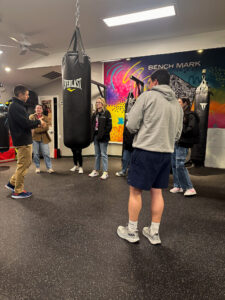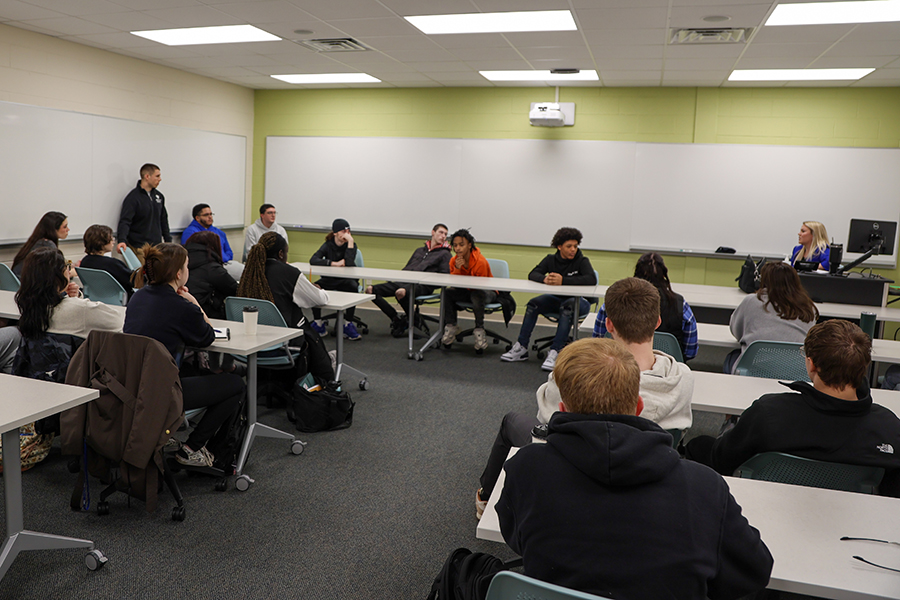Elizabethtown College students enrolled in a Criminal Justice – Juvenile Justice System course partnered with the local non-profit organization Bench Mark, to gain hands-on experience with at-risk youth navigating the juvenile justice system through semester-long research, on-campus panels, and several site visits.
Located in Lancaster City, Bench Mark supports at-risk youth and young adults through fitness, academics, career coaching, and leadership education through free personal training and mentorship programs.
“It is important for Etown’s Criminal Justice students to interact with youth to understand reasons why they engage, or don’t engage, in delinquency,” Elizabethtown College Director of the Criminal Justice Program, Kadee Crandall said. “Prevention and response programs are pertinent to deter future offending.”

Etown students visit Bench Mark facility in Feb. 2024
During the spring semester, Etown students joined Bench Mark staff within the Lancaster County Youth Intervention Center, which provides detention, shelter care services, and alternative treatment programs for youth, to observe the staff members creating meaningful connections and teaching a variety of leadership and life skills lessons to both shelter residents and detention residents.
The group took a tour of Bench Mark’s main gym space and were shown how each program operates and is connected to each other as well as learned how the programs are funded and governed.
“Being able to witness this side of juvenile delinquency has allowed me to get a better understanding of how important it is for juveniles to feel safe and be given the best opportunities possible,” Elizabethtown College Criminal Justice major Alexis Cooper ’25 said. “As an aspiring probation/parole officer, it was insightful to hear the experiences that these juveniles had with the system because it gave me a better understanding of the type of probation/parole officer I want to be.”
Etown students were then divided into groups and paired with Bench Mark students and staff. Bench Mark staff facilitated group discussions about the juvenile justice system, allowing Bench Mark students to share their personal lived experiences. Group discussions included ways in which the juvenile justice system could improve, the qualities of a good probation officer, and the primary influences that lead young people to perpetuate violence in the community.
“These discussions allow Bench Mark students to realize that their individual stories are valuable and worth sharing and these discussions allow Etown students to converse and ask questions of young people who are currently living through the juvenile justice system and are willing to speak openly about their experiences,” Bench Mark Founder and Executive Director, Will Kiefer said. “From what I’ve observed, this dialogue between two very different groups gives me hope that young leaders heading into the juvenile or criminal justice field may be able to incorporate what they’ve learned from our Bench Mark students into overall system changes they advocate for in the future.”
This semester, Etown students are researching, reviewing, and proposing juvenile justice programs related to or in support of the Bench Mark Program. A final proposal on program recommendations will be provided to Kiefer for review.
Earlier in the semester, students in Crandall’s class listened to a panel session of Bench Mark students who came to campus to further share their experience in the juvenile justice system. Crandall hopes to continue the collaboration between Etown Criminal Justice students and Bench Mark in the future.
“This partnership provides Etown students real-world experience and supports the mission of the Bench Mark Program,” Crandall said.
About Etown’s Criminal Justice Program
Students majoring in Criminal Justice at Elizabethtown College gain a strong ability to conduct research, analyze information, and think critically about topics like relationship building and community interactions. This major prepares students to be employed in Criminal Justice related fields with skills that set them apart from graduates of other programs or to enter a graduate degree program in a related field. Learn more.

